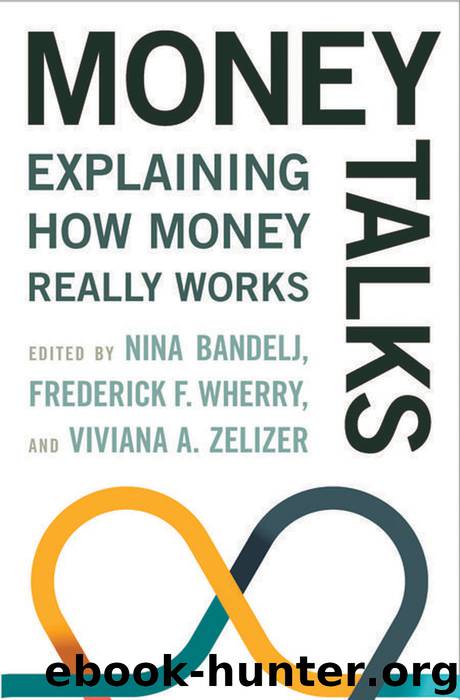Money Talks by Unknown

Author:Unknown
Language: eng
Format: epub
ISBN: 9780691168685
Publisher: Princeton University Press
Published: 2017-01-15T07:00:00+00:00
Institutionalizing the Mirage
But what is the relation between these theological arguments and the contemporary market mirage? An intertwined intellectual and juridical legacy of these early theological debates has continuing relevance. Notably, soon after Pierre Nicole put forward his argument concerning the beneficial consequences of the exchange of sinful self-love, we find the first recognizably economic analysis of the market in the work of Pierre de Boisguilbert, a Norman noble and administrator, who had studied with Nicole in the main Jansenist school of Port-Royal des Champs. Boisguilbert produced the first analytic account of the unintended benefits of market exchange and used this theory to criticize the overreaching governmental bureaucracy of Louis XIV (Boisguilbert [1695–1710] 1966; Faccarello 1999). Marx ([1859] 1904: 56) later identified Boisguilbert as the founder of the French branch of political economy, and a relatively direct line of influence runs between Boisguilbert and the later work of the économistes (or Physiocrats) Quesnay and Turgot, from whom the Scottish economists Hume and Smith borrowed a great deal (Groenewegen 2002). Full recognition of this influence has been complicated by the fact that what began, with Boisguilbert and the Jansenists, as a program of laissez-faire opposed to the centralizing French monarchy became, over the course of the eighteenth century, a program of top-down economic liberalization pursued by royal advisers and administrators keen to deploy central power to promote and protect market relations.14
In parallel to this intellectual development, and the related activity of the French économistes in attempting to reform the ancien régime, was a Jansenistinfluenced program of legal codification that delivered the foundational law codes of France—and, after Napoleon, much of the European continent (Pena 1992). This program reflected the centralization of power in the French monarchy, which sought to promulgate unifying national codes. While these codes were heavily indebted to Roman law, their drafting was executed by jurists with links to the Jansenists: first, under Louis XIV, by the Jansenist jurist Jean Domat;15 and second, in the mid-eighteenth century, by Jean-Etienne-Marie Portalis, sometimes called the “father of the civil code” (Chartier 2004), and others who drew on natural law and Jansenist principles—the latter source often obscured, because Jansenism was banned in the early eighteenth century (Arnaud 1969).
These early efforts provided much of the foundation for the major codification project of the later French Revolution, which produced the famous Napoleonic Code (Levasseur 1969; Halpérin 1992). Through the Code and the power of Napoleon, the Directory achieved the long-sought goal of the économistes: the legal foundation for economic liberalism and the “legal despotism” capable of enforcing it.16 The market mirage thus became part of a consolidated juridical order; it did not remain in the realm of ideas and ideals but was enacted, at least partly, through law.
In suggesting that an early modern political theology of fallen humanity provided the origins of the mirage, I may have answered one historical question at the expense of introducing many others. Why, after all, did it take the Jansenists to arrive at this interpretation of Augustine—and why
Download
This site does not store any files on its server. We only index and link to content provided by other sites. Please contact the content providers to delete copyright contents if any and email us, we'll remove relevant links or contents immediately.
Kathy Andrews Collection by Kathy Andrews(11830)
The remains of the day by Kazuo Ishiguro(8997)
Spare by Prince Harry The Duke of Sussex(5194)
Paper Towns by Green John(5188)
The Body: A Guide for Occupants by Bill Bryson(5096)
Industrial Automation from Scratch: A hands-on guide to using sensors, actuators, PLCs, HMIs, and SCADA to automate industrial processes by Olushola Akande(5061)
Machine Learning at Scale with H2O by Gregory Keys | David Whiting(4312)
Be in a Treehouse by Pete Nelson(4051)
Never by Ken Follett(3954)
Harry Potter and the Goblet Of Fire by J.K. Rowling(3856)
Goodbye Paradise(3809)
The Remains of the Day by Kazuo Ishiguro(3408)
Into Thin Air by Jon Krakauer(3398)
Fairy Tale by Stephen King(3392)
The Cellar by Natasha Preston(3342)
The Genius of Japanese Carpentry by Azby Brown(3308)
120 Days of Sodom by Marquis de Sade(3273)
Reminders of Him: A Novel by Colleen Hoover(3116)
Drawing Shortcuts: Developing Quick Drawing Skills Using Today's Technology by Leggitt Jim(3080)
